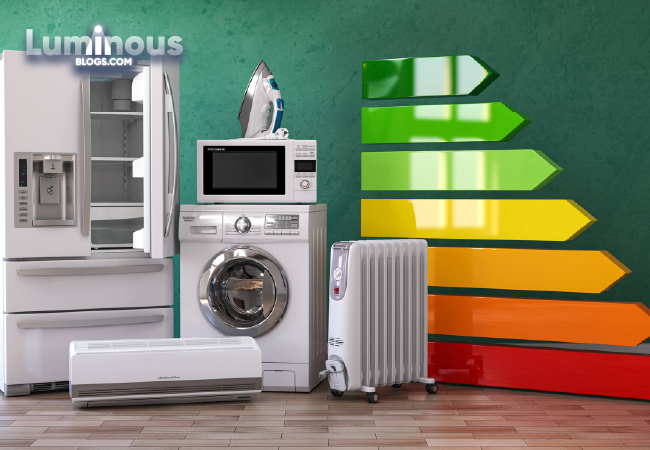
Home of the Future: Smart Appliances and Their Benefits
Welcome to the future – a future where our homes are not just spaces to live in, but intelligent environments designed for convenience, efficiency, and sustainability. Smart appliances are at the heart of this transformation, offering a plethora of benefits that can enhance our daily lives while reducing our ecological footprint. In this blog, we'll explore the world of smart appliances, their evolving capabilities, and the numerous advantages they bring to modern homes.
The Rise of Smart Appliances
The concept of a "smart home" is rapidly becoming a reality thanks to the advancement of technology. Smart appliances, once a novelty, have now become mainstream. These appliances are equipped with sensors, Wi-Fi connectivity, and intelligent software that enable them to interact with each other, learn from user behavior, and be controlled remotely.
Types of Smart Appliances
Smart Refrigerators: These refrigerators can do much more than just keep your food cold. They can monitor your food inventory, suggest recipes based on available ingredients, and even send you expiration date reminders.
Smart Ovens: Smart ovens allow you to control cooking times and temperatures remotely, ensuring your meals are ready when you want them. They often come with recipe apps and cooking suggestions.
Smart Washing Machines and Dryers: These appliances offer features like app control, remote monitoring, and the ability to download custom washing programs based on fabric type.
Smart Dishwashers: Smart dishwashers can detect the level of dirt on your dishes and adjust the wash cycle accordingly. They can also notify you when you're running low on detergent.
Smart Thermostats: Although not appliances in the traditional sense, smart thermostats like the Nest Learning Thermostat can regulate your home's temperature efficiently by learning your preferences.
Smart Vacuum Cleaners: Robotic vacuum cleaners with smart technology can autonomously clean your floors and return to their docking stations when their job is done.
Smart Lighting: Smart bulbs and lighting systems can be controlled remotely, allowing you to create customizable lighting scenes and save energy.
Benefits of Smart Appliances
The advantages of smart appliances go beyond mere convenience; they encompass economic, environmental, and even health-related benefits.
Energy Efficiency
Smart appliances are designed to be energy-efficient. They can optimize their usage by running during off-peak hours or adjusting settings based on real-time data, ultimately reducing your energy bills.
Time Savings
Imagine being able to preheat your oven or start your coffee maker from your phone before you even get out of bed. Smart appliances can save you precious time in your daily routine.
Remote Monitoring
You can monitor your appliances remotely using smartphone apps. This means you can check whether you left the oven on or receive alerts if your refrigerator door is left open.
Long-Term Cost Savings
While the initial investment in smart appliances may be higher, their long-term cost savings can outweigh the upfront costs. Reduced energy consumption and lower utility bills can make them a wise financial choice.
Enhanced Safety
Smart appliances can contribute to a safer home environment. For example, smart stoves can automatically shut off if they detect an unattended pot, preventing potential accidents.
Environmental Impact
Using less energy is not only cost-effective but also reduces your carbon footprint. Smart appliances help mitigate environmental impact by conserving resources and decreasing greenhouse gas emissions.
Personalized Convenience
Smart appliances can adapt to your preferences. For example, a smart coffee maker can brew your favorite coffee as soon as you wake up, and a smart thermostat can adjust the temperature to your liking.
Health and Well-Being
Some smart appliances, like air purifiers and water filters, can contribute to a healthier living environment by purifying air and water, which is essential for overall well-being.
Appliance Longevity
Smart appliances often come with self-diagnostic capabilities. They can detect issues early and notify you when maintenance is required, potentially extending the life of your appliances.
Challenges and Considerations
While the benefits of smart appliances are significant, there are some considerations to keep in mind:
Initial Cost: Smart appliances are generally more expensive than their traditional counterparts. However, their long-term cost savings and advantages can make them a worthwhile investment.
Compatibility: Ensure that the smart appliances you choose are compatible with your existing devices and systems, such as your smartphone and home network.
Privacy and Security: Smart appliances are connected to the internet, which means they can be vulnerable to cyberattacks. It's essential to follow security best practices and keep your software up to date.
Learning Curve: Using smart appliances may require some adjustment to your daily routines. Familiarize yourself with the features and settings to make the most of them.
The Future of Smart Appliances
As technology continues to evolve, the potential for smart appliances is limitless. In the future, we can expect even more sophisticated features, increased connectivity, and improved energy efficiency. Innovations such as artificial intelligence and machine learning will enable appliances to anticipate our needs and adapt to our preferences seamlessly.
The home of the future is a place where our appliances don't just serve us but understand us. They are more than machines; they are companions, making our lives easier, more sustainable, and enjoyable. With the benefits of smart appliances, we're not just upgrading our homes; we're redefining our way of life. It's a future that's both exciting and full of potential, one where our homes truly work for us, creating a more comfortable, efficient, and sustainable lifestyle.


